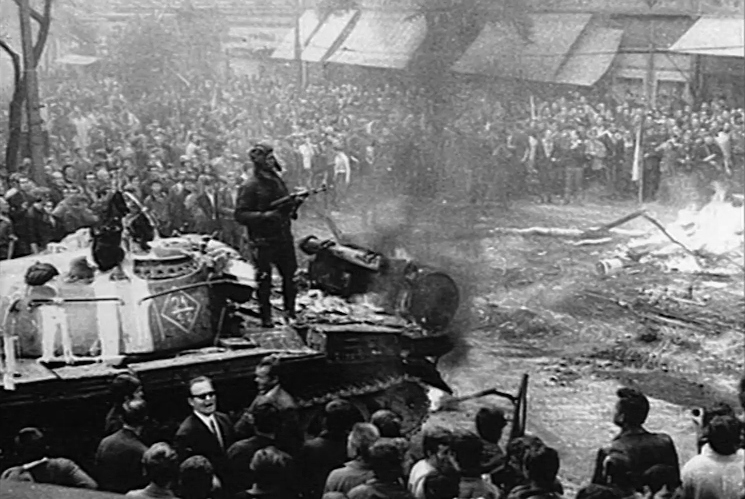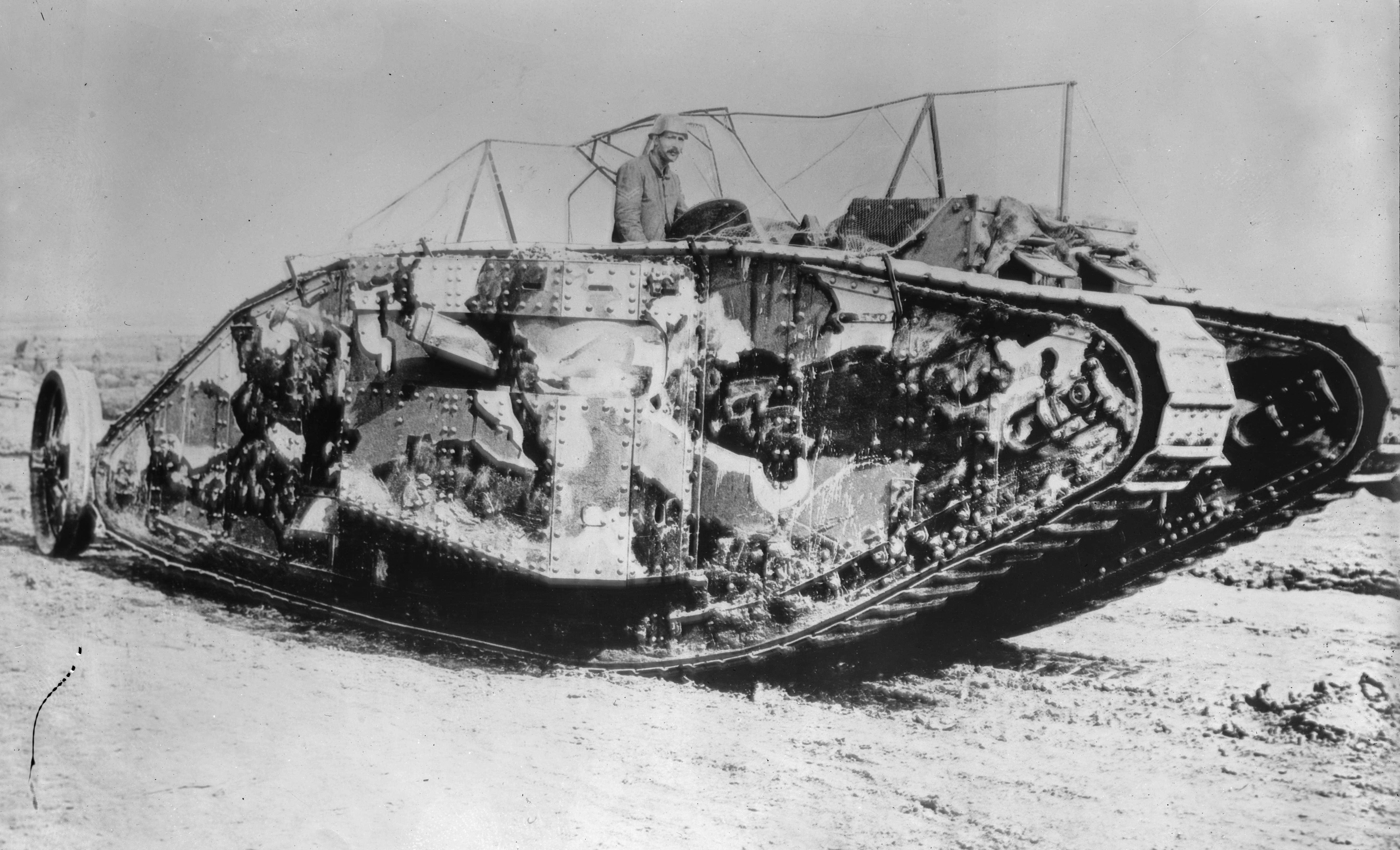|
Tankies
''Tankie'' is a pejorative label generally applied to authoritarian communists, especially those who support or defend acts of repression by such regimes, their allies, or deny the occurrence of the events thereof. More specifically, the term has been applied to those who express support for one-party Marxist–Leninist socialist republics, whether contemporary or historical. It is commonly used by anti-authoritarian leftists, anarchists, libertarian socialists, left communists, democratic socialists, and reformists to criticise Leninism, although the term has seen increasing use by liberal and right‐wing factions as well. The term "tankie" was originally used by dissident Marxist–Leninists to describe members of the Communist Party of Great Britain (CPGB) who followed the party line of the Communist Party of the Soviet Union (CPSU). Specifically, it was used to distinguish party members who spoke out in defence of the Soviet use of tanks to suppress the Hungarian ... [...More Info...] [...Related Items...] OR: [Wikipedia] [Google] [Baidu] |
Communist Party Of Great Britain
The Communist Party of Great Britain (CPGB) was the largest communist organisation in Britain and was founded in 1920 through a merger of several smaller Marxist groups. Many miners joined the CPGB in the 1926 general strike. In 1930, the CPGB founded the ''Daily Worker'' (renamed the Morning Star (British newspaper), ''Morning Star'' in 1966). In 1936, members of the party were present at the Battle of Cable Street, helping organise resistance against the British Union of Fascists. In the Spanish Civil War, the CPGB worked with the USSR to create the British Battalion of the International Brigades, which party activist Bill Alexander (British politician), Bill Alexander commanded. In World War II, the CPGB followed the Comintern position, opposing or supporting the war in line with the involvement of the USSR. By the end of World War II, CPGB membership had nearly tripled and the party reached the height of its popularity. Many key CPGB members served as leaders of Britain's tr ... [...More Info...] [...Related Items...] OR: [Wikipedia] [Google] [Baidu] |
Authoritarian Communism
Authoritarian socialism, or socialism from above, is an economic and political system supporting some form of socialist economics while rejecting political pluralism. As a term, it represents a set of economic-political systems describing themselves as "socialist" and rejecting the liberal-democratic concepts of multi-party politics, freedom of assembly, ''habeas corpus,'' and freedom of expression, either due to fear of counter-revolution or as a means to socialist ends. Journalists and scholars have characterised several countries, most notably the Soviet Union, China, Cuba, and their allies, as authoritarian socialist states. Contrasted to democratic, anti-statist, and libertarian forms of socialism, authoritarian socialism encompasses some forms of African, Arab and Latin American socialism. Although considered an authoritarian or illiberal form of state socialism, often referred to and conflated as ''socialism'' by critics and argued as a form of state capitalism ... [...More Info...] [...Related Items...] OR: [Wikipedia] [Google] [Baidu] |
Tank
A tank is an armoured fighting vehicle intended as a primary offensive weapon in front-line ground combat. Tank designs are a balance of heavy firepower, strong armour, and battlefield mobility provided by tracks and a powerful engine; their main armament is often mounted within a turret. They are a mainstay of modern 20th and 21st century ground forces and a key part of combined arms combat. Modern tanks are versatile mobile land weapons platforms whose main armament is a large- calibre tank gun mounted in a rotating gun turret, supplemented by machine guns or other ranged weapons such as anti-tank guided missiles or rocket launchers. They have heavy vehicle armour which provides protection for the crew, the vehicle's munition storage, fuel tank and propulsion systems. The use of tracks rather than wheels provides improved operational mobility which allows the tank to overcome rugged terrain and adverse conditions such as mud and ice/snow better than wheele ... [...More Info...] [...Related Items...] OR: [Wikipedia] [Google] [Baidu] |
China
China, officially the People's Republic of China (PRC), is a country in East Asia. With population of China, a population exceeding 1.4 billion, it is the list of countries by population (United Nations), second-most populous country after India, representing 17.4% of the world population. China spans the equivalent of five time zones and Borders of China, borders fourteen countries by land across an area of nearly , making it the list of countries and dependencies by area, third-largest country by land area. The country is divided into 33 Province-level divisions of China, province-level divisions: 22 provinces of China, provinces, 5 autonomous regions of China, autonomous regions, 4 direct-administered municipalities of China, municipalities, and 2 semi-autonomous special administrative regions. Beijing is the country's capital, while Shanghai is List of cities in China by population, its most populous city by urban area and largest financial center. Considered one of six ... [...More Info...] [...Related Items...] OR: [Wikipedia] [Google] [Baidu] |
Cuba
Cuba, officially the Republic of Cuba, is an island country, comprising the island of Cuba (largest island), Isla de la Juventud, and List of islands of Cuba, 4,195 islands, islets and cays surrounding the main island. It is located where the northern Caribbean Sea, Gulf of Mexico, and Atlantic Ocean meet. Cuba is located east of the Yucatán Peninsula (Mexico), south of both Florida and the Bahamas, west of Hispaniola (Haiti/Dominican Republic), and north of Jamaica and the Cayman Islands. Havana is the largest city and capital. Cuba is the List of countries and dependencies by population, third-most populous country in the Caribbean after Haiti and the Dominican Republic, with about 10 million inhabitants. It is the largest country in the Caribbean by area. The territory that is now Cuba was inhabited as early as the 4th millennium BC, with the Guanahatabey and Taino, Taíno peoples inhabiting the area at the time of Spanish colonization of the Americas, Spanish colonization ... [...More Info...] [...Related Items...] OR: [Wikipedia] [Google] [Baidu] |
Belarus
Belarus, officially the Republic of Belarus, is a landlocked country in Eastern Europe. It is bordered by Russia to the east and northeast, Ukraine to the south, Poland to the west, and Lithuania and Latvia to the northwest. Belarus spans an area of with a population of . The country has a hemiboreal climate and is administratively divided into Regions of Belarus, six regions. Minsk is the capital and List of cities and largest towns in Belarus, largest city; it is administered separately as a city with special status. For most of the medieval period, the lands of modern-day Belarus was ruled by independent city-states such as the Principality of Polotsk. Around 1300 these lands came fully under the Grand Duchy of Lithuania and subsequently by the Polish–Lithuanian Commonwealth; this period lasted for 500 years until the Partitions of Poland, 1792-1795 partitions of Poland-Lithuania placed Belarus within the Belarusian history in the Russian Empire, Russian Empire for the fi ... [...More Info...] [...Related Items...] OR: [Wikipedia] [Google] [Baidu] |
Authoritarianism
Authoritarianism is a political system characterized by the rejection of political plurality, the use of strong central power to preserve the political ''status quo'', and reductions in democracy, separation of powers, civil liberties, and the rule of law. Authoritarian regimes may be either autocratic or oligarchic and may be based upon the rule of a party or the military. States that have a blurred boundary between democracy and authoritarianism have sometimes been characterized as "hybrid democracies", " hybrid regimes" or "competitive authoritarian" states. The political scientist Juan Linz, in an influential 1964 work, ''An Authoritarian Regime: Spain'', defined authoritarianism as possessing four qualities: # Limited political pluralism, which is achieved with constraints on the legislature, political parties and interest groups. # Political legitimacy based on appeals to emotion and identification of the regime as a necessary evil to combat "easily recognizabl ... [...More Info...] [...Related Items...] OR: [Wikipedia] [Google] [Baidu] |
Anti-Western Sentiment
Anti-Western sentiment, also known as anti-Atlanticism or Westernophobia, refers to broad opposition, bias, or hostility towards the people, culture, or policies of the Western world. This sentiment is found worldwide. It often stems from anti-imperialism and criticism of past colonial actions by Western powers. For example, in Africa, figures like Patrice Lumumba and Mobutu Sese Seko blamed the West for imperialism in the Congo region. In Ethiopia, resentment over internal politics and conflict resolution during the Tigray War led to anti-Western sentiment. In the Middle East, Pan-Arabism and Islamism contribute to anti-Western attitudes. Jihadist groups like al-Qaeda and ISIS view Western countries as targets for terrorism due to perceived insults against Islam and military interventions in Muslim countries. Many Latin American countries harbor criticism due to historical American and European interventions. In Russia, anti-Western sentiment has been endorsed by many ... [...More Info...] [...Related Items...] OR: [Wikipedia] [Google] [Baidu] |
Political Spectrum
A political spectrum is a system to characterize and classify different Politics, political positions in relation to one another. These positions sit upon one or more Geometry, geometric Coordinate axis, axes that represent independent political dimensions. The expressions political compass and political map are used to refer to the political spectrum as well, especially to popular two-dimensional models of it. Most long-standing spectra include the Left–right politics, left–right dimension as a measure of social, political and economic Social hierarchy, hierarchy which originally referred to seating arrangements in the French parliament after the French Revolution, Revolution (1789–1799), with Classical radicalism, radicals on Left-wing politics, the left and Aristocracy, aristocrats on Right-wing politics, the right. While communism and socialism are usually regarded internationally as being on the left, conservatism and Reactionary, reactionism are generally regarded as ... [...More Info...] [...Related Items...] OR: [Wikipedia] [Google] [Baidu] |
Mao Zedong
Mao Zedong pronounced ; traditionally Romanization of Chinese, romanised as Mao Tse-tung. (26December 18939September 1976) was a Chinese politician, revolutionary, and political theorist who founded the People's Republic of China (PRC) in 1949 and led the country from Proclamation of the People's Republic of China, its establishment until Death and state funeral of Mao Zedong, his death in 1976. Mao served as Chairman of the Chinese Communist Party (CCP) from 1943 until his death, and as the party's ''de facto'' leader from 1935. His theories, which he advocated as a Chinese adaptation of Marxism–Leninism, are known as Maoism. Born to a peasant family in Shaoshan, Hunan, Mao studied in Changsha and was influenced by the 1911 Revolution and ideas of Chinese nationalism and anti-imperialism. He was introduced to Marxism while working as a librarian at Peking University, and later participated in the May Fourth Movement of 1919. In 1921, Mao became a founding member of the ... [...More Info...] [...Related Items...] OR: [Wikipedia] [Google] [Baidu] |
Joseph Stalin
Joseph Vissarionovich Stalin (born Dzhugashvili; 5 March 1953) was a Soviet politician and revolutionary who led the Soviet Union from 1924 until Death and state funeral of Joseph Stalin, his death in 1953. He held power as General Secretary of the Communist Party of the Soviet Union, General Secretary of the Communist Party from 1922 to 1952 and as the fourth Premier of the Soviet Union, premier from 1941 until his death. He initially governed as part of a Collective leadership in the Soviet Union, collective leadership, but Joseph Stalin's rise to power, consolidated power to become an absolute dictator by the 1930s. Stalin codified the party's official interpretation of Marxism as Marxism–Leninism, while the totalitarian political system he created is known as Stalinism. Born into a poor Georgian family in Gori, Georgia, Gori, Russian Empire, Stalin attended the Tiflis Theological Seminary before joining the Marxist Russian Social Democratic Labour Party. He raised f ... [...More Info...] [...Related Items...] OR: [Wikipedia] [Google] [Baidu] |








